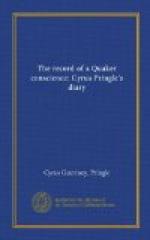During the Civil War in America, President Lincoln, eager as he was to win the war, was always deeply in sympathy with the Quakers, and he stretched his administrative powers to their full limit to provide relief for conscientious convictions. In the early stages of the great conflict the President wrote the following kindly note in answer to a message from New England Yearly Meeting of the Society of Friends: “Engaged as I am, in a great war, I fear it will be difficult for the world to understand how fully I appreciate the principles of peace inculcated in this letter [of yours] and every where by the Society of Friends."[1] Both he and Secretary Stanton made many positive efforts to find some way of providing for the tender consciences of Friends without being unfair to the rights of others. They even requested American Friends to call a conference to consider how to find a satisfactory solution of the problem. Such a conference was held in Baltimore, December 7th, 1863, and the Friends there assembled expressed great appreciation of “the kindness evinced at all times by the President and Secretary of War.” A delegation from this conference visited Washington and, in co-operation with Secretary Stanton, succeeded in securing a clause in the enrolment bill, declaring Friends to be non-combatants, assigning all drafted Friends to hospital service or work among freedmen, and further providing for the entire exemption of Friends from military service on the payment of $300 into a fund for the relief of sick and wounded.[2]
On several occasions Friends in larger or smaller groups went to Washington for times of prayer and spiritual communion with the great President. These times were deeply appreciated by the heavily burdened man. Tears ran down his cheeks, we are told, as he sat bowed in solemn silence or knelt as some moved Friend prayed for him to Almighty God. Writing of the visit of Isaac and Sarah Harvey of Clinton County, Ohio, in the autumn of 1862, Lincoln tenderly said: “May the Lord comfort them as they have sustained me.” A letter written by the President in 1862 to Eliza P. Gurney, one of a small group of Friends who visited him and prayed with him in the autumn of that year, reveals forcibly how he regarded these occasions:
“I am glad of this interview, and glad to know that I have your sympathy and prayers. We are indeed going through a great trial—a fiery trial. In the very responsible position in which I happen to be placed, being a humble instrument in the hands of our Heavenly Father, as I am, and as we all are, to work out his great purposes, I have desired that all my works and acts may be according to his will, and that it might be so, I have sought his aid; but if, after endeavouring to do my best in the light which he affords me, I find my efforts fail, I must believe that for some purpose unknown to me, his will is otherwise. If I had had my way, this war would never have been commenced. If I had been allowed my way,




